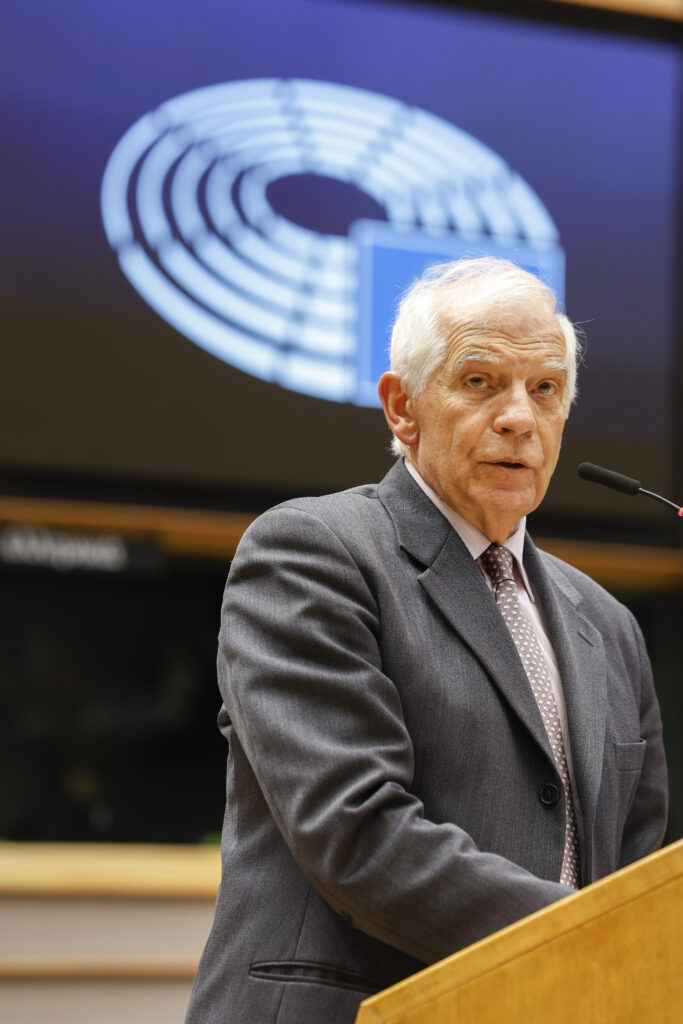Brussels – The European Union “must be ready” after the election of Donald Trump in the United States. This was the warning of the EU High Representative for Foreign Affairs, Josep Borrell, during the plenary of the European Parliament in Brussels.
The cryptic message comes during the debate regarding EU-US relations. Trump’s victory, according to Borrell, is not “accidental, but shows a profound social change in US society, also seen on the other side of the Atlantic. The consequences of this election will be felt in the coming years, according to the High Representative.

Any action that Trump decides to take will impact the EU, and “the key words are security, trade, and technology,” Borrell adds. Whether it is tariffs on European or Chinese products, US decisions will directly or indirectly affect European competitiveness and the geopolitical balance in which the EU operates.
Ukraine, the Middle East, and the China-Taiwan relationship are the ‘hot potatoes’ of the future. Regarding the former, Borrell during his visit to Kyiv had clearly said: “Ukraine has been fighting in order to get independence, and to look for a space in the geopolitical landscape. And the place for you has been decided: it is the European Union.” The promise of joining the EU requires a strategy to offset any US disengagement, including rethinking how to use frozen Russian funds.
Borrell urges to focus on “our security,” with actual actions (as opposed to the slogans after the first Trump term), for example, related to increasing military spending. “The European Union is not only an economic union, but also a political union,” in which the development of security and defense policy falls, the High Representative reminds, as with the Strategic Compass.
It is not insignificant for the High Representative that the Union is not so united in its reactions to Trump. And the debate among MEPs gives him full credit.
“The US election result told us nothing new,” begins MEP Andrzej Halicki of the EPP, confirming citizens’ demands on security, mirrored in the EU as well. The Pole highlights the importance of greater European autonomy in defense, which, as Borrell also mentions, requires more investment. Halicki winks at his government’s (nationalist) “East Shield” project, which he says should be supported and taken into account to strengthen the borders.
Alongside the moderation of the EPP, there is enthusiasm from the Patriots for Europe. “The European Union must learn lessons and take care of the nations that comprise it,” said Jordan Bardella of PfE, comparing Trumpian nationalism to democratic Europe. It also must focus on not falling behind economically, more than it already has, by simplifying and helping its industries. “Let’s wake up, or we risk disappearing,” he warns in his conclusion.
The president of the Renew Group, Valerie Hayer, shares this opinion even though she is less enthusiastic. It will be crucial for the EU to defend its interests, move out of a wait-and-see mode, and protect itself, especially with Ukraine increasingly in the balance. “What is at stake is our security,” Hayer adds, on which there is a lack of investment and the market is too fragmented. In addition, the EU needs to think about its own competitiveness and innovation regarding artificial intelligence, where it is still lagging.
Nicola Procaccini of the ECR shows confidence: “The outcome of the US elections will not change the relationship between the EU and the US.” He is confident that relations between the two sides of the Atlantic will remain solid, even though these elections “have burst the bubble in Brussels.” Procaccini was referring to the European left (about whose frustration he gloats a bit), which, he says, has not understood voters and what they want. Also back with ECR is the talk about defense and the need to strengthen within NATO, but, in his case, with a smile on his face.
Far from a smile were the words of MEP Yannis Maniatis of S&D. “The EU must become strategically autonomous” from the US since the first term gave a clear idea of how Trump relates to international relations: No multilateralism, little international law, and the green transition that could go up in smoke, according to Maniatis. The EU must push to be independent and autonomous as the stakes are high.
“The US […] will be ruled by a professed anti-democrat,” says Martin Schirdewan of The Left. Critical of the Musk-Trump duo (rightly so), he speaks of an oligarchy, especially with the risks from the spread of fake news. He also beats him on the point of defense and the risks to the industry, which must be “ready for the future.”
Terry Reintke of the Greens/Ale calls for a stronger European Union. He does not congratulate those who “will do damage in the world and to the EU,” which the far right does not seem to realize. Reintke calls for investment in “European independence from autocrats,” whether Trump or Putin, with much focus on global European goals, such as those on climate change.
“This situation is not the end of the world, but it is definitely the beginning of a different world,” said Borrell, summing up the European puzzle. The question, to which the answer could be uncomfortable, is whether the European Union will be able to be a part of it.
English version by the Translation Service of Withub






